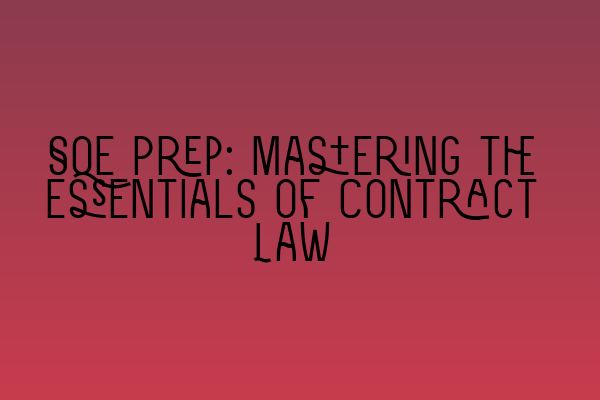Are you preparing for the Solicitors Qualifying Examination (SQE)? Do you want to ensure you have a strong foundation in contract law? Look no further! In this article, we will discuss the essentials of contract law and provide you with valuable tips to master this subject.
Before we dive into the details, let’s briefly explore what the SQE is. The SQE is a new assessment that is set to replace the Qualifying Law Degree and the Legal Practice Course as the route to qualifying as a solicitor in England and Wales. It consists of two stages: SQE1, which focuses on legal knowledge, and SQE2, which tests practical skills.
Now, let’s focus on contract law, one of the key areas you’ll need to master for the SQE. Contract law governs the formation and enforcement of agreements between parties. It’s crucial for any aspiring solicitor to have a solid understanding of contract law, as it forms the basis of many legal transactions and disputes.
Elements of a Contract
Before we delve into the intricacies of contract law, let’s familiarize ourselves with the essential elements of a contract. To form a valid contract, you need:
- An offer: a clear expression of willingness to enter into a contract
- Acceptance: an unqualified agreement to the terms of the offer
- Consideration: something of value exchanged between the parties
- Intention to create legal relations: an intention to be legally bound by the terms of the contract
- Capacity: the legal ability to enter into a contract
- Legality: a contract that complies with the laws of the jurisdiction
Understanding these elements is fundamental to analyzing and applying contract law principles.
Breaches of Contract
Contracts are not immune to disputes, and breaches can occur. A breach of contract happens when one party fails to fulfill their obligations as outlined in the contract. Breaches can be categorized into three types:
- Material breach: a substantial violation that goes to the core of the contract
- Minor breach: a less significant violation that generally does not undermine the purpose of the contract
- Anticipatory breach: when one party indicates in advance that they will not fulfill their obligations
When a breach occurs, the non-breaching party may be entitled to remedies such as damages, specific performance, or cancellation of the contract. It is essential to understand the different types of breaches and the available remedies to effectively advise clients and resolve disputes.
Essential Concepts in Contract Law
Now that we’ve covered the fundamental elements and breaches of a contract, let’s explore some essential concepts you need to master for the SQE:
- Offer and Acceptance: Understanding the rules governing the formation of a valid offer and acceptance is crucial. You need to grasp concepts such as the invitation to treat, counteroffers, and the postal rule.
- Terms and Representations: Distinguishing between contractual terms, representations, and mere puffs is essential. This knowledge will help you assess the enforceability and impact of different statements made during contract negotiations.
- Mistake and Misrepresentation: Knowing when a contract can be set aside due to mistake or misrepresentation is vital. Understanding the types of mistake and the remedies available is key to advising clients and resolving disputes effectively.
- Privity of Contract: Familiarize yourself with the rule that limits the rights and obligations under a contract to the parties involved. Explore exceptions such as assignment and third-party rights.
- Discharge of Contract: Learn about the various ways in which a contract can be discharged, whether by performance, agreement, frustration, breach, or operation of law.
Mastering these essential concepts will provide you with a strong foundation in contract law and increase your chances of success in the SQE. Practice applying these concepts to real-life case studies to enhance your ability to analyze and solve complex legal problems.
Preparing for the SQE
Now that you understand the essentials of contract law for the SQE, it’s crucial to have a solid study plan in place. Here are some tips to help you prepare effectively:
- Organize your study materials: Gather reliable resources such as textbooks, casebooks, and online materials. Create a study schedule to allocate dedicated time for contract law revision.
- Review past exam questions: Familiarize yourself with the format and types of questions asked in previous SQE exams. Practice answering these questions to improve your exam technique and time management skills.
- Consult study aids: Utilize study aids such as flashcards, mnemonic techniques, and flowcharts to reinforce your understanding of key concepts and make revision more efficient.
- Join study groups: Collaborate with fellow aspiring solicitors to discuss contract law topics, share insights, and engage in peer-to-peer learning. Exploring different perspectives can deepen your understanding of complex legal principles.
- Seek guidance from experts: Consider working with a contract law tutor or attending revision courses tailored for the SQE. Their expertise and guidance can help you focus on areas that require improvement.
By implementing these strategies and dedicating sufficient time and effort to contract law revision, you’ll be well-prepared to tackle the contract law components of the SQE.
Now that you’ve gained insight into the essentials of contract law for the SQE, you may be interested in further exploring related topics:
- Unveiling Real-Life Case Studies: Insights into Legal Practice and Decision-Making
- Exploring Solicitor Salaries in the UK: Average Earnings and Factors Affecting Income
- Mastering Client Relationship Management: Skills for Solicitors to Enhance Trust and Loyalty
- Pursuing a Law School Education in the UK: Choosing the Right Path for Your Future
- Securing Training Contracts: A Roadmap to Becoming a Solicitor
We hope this article has provided you with valuable insights into mastering the essentials of contract law for the SQE. Remember to approach your study plan with dedication and immerse yourself in contract law principles to excel in this subject. Good luck with your SQE preparation!
by
Tags:
